
Navigating the intricacies of sales tax regulations in the Lone Star State is essential to running your business successfully, whether you are a seasoned entrepreneur or just entering the market. This process has many moving parts, but this go-to resource will help you keep track of everything.
Filing your sales tax in Texas is a simple process when you know your filing frequency, understand how origin-based sales tax applies to your business and keep thorough records on both taxable and nontaxable sales. Remember to investigate sales tax exemptions to see where your business can qualify for an exception. This benefits your business and helps you avoid some costly mistakes later on. Learn more in our comprehensive Texas sales and use tax guide.

Originally known as “Limited Sales and Use Tax,” sales tax is paid to local and state authorities based on sales in the form of goods or services. Sales tax is also collected on the rental and lease of goods or services. This tax is added at the point of sale and administered by the Texas Comptroller of Public Accounts, effective from March 2019.
Businesses are responsible for their own tax collection and remitting to the Texas Comptroller’s office. The seller acts as a de facto tax collector, as this tax goes directly to the state, and failure to comply leads to interest charges and penalties.
The statewide sales tax rate sits at 6.25%. Additionally, local taxing jurisdictions like cities, counties, transit authorities and special-purpose districts can charge a local surtax. On top of the 6.25%, a seller can add a maximum of 2% for local surtax, increasing the total sales tax to be collected. To confirm your local surtax, research the area where you conduct business.
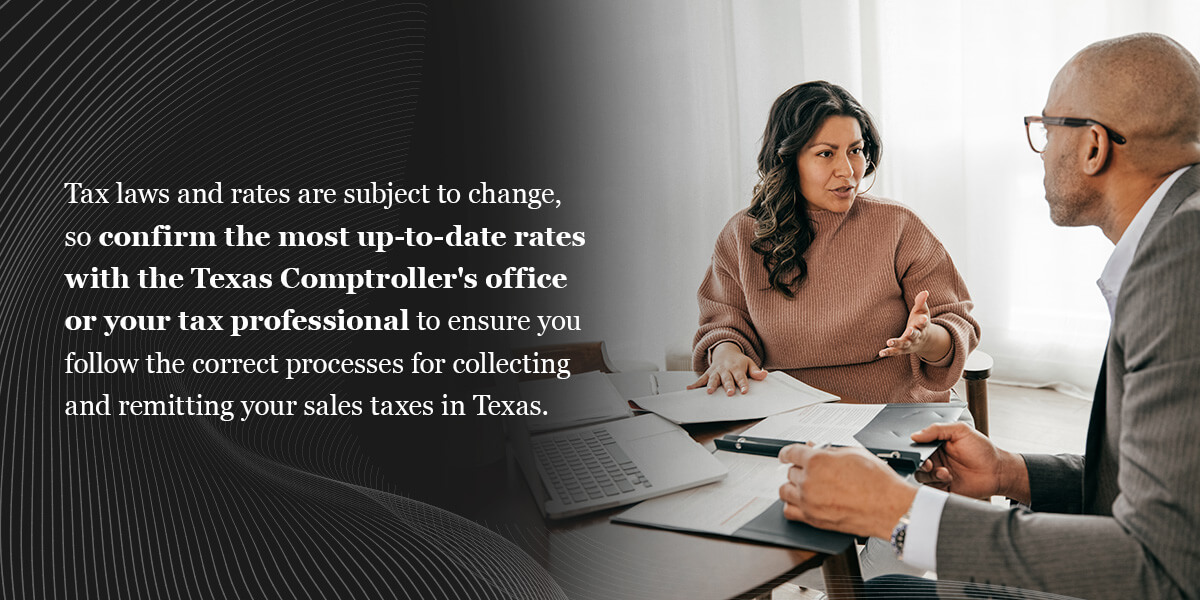
Tax laws and rates are subject to change, so confirm the most up-to-date rates with the Texas Comptroller’s office or your tax professional to ensure you follow the correct processes for collecting and remitting your sales taxes in Texas.
There are a few exceptions where sales tax is not collected at the point of purchase:
Use tax complements the state’s sales tax and occurs when a buyer purchases a taxable item within the state, but the seller does not collect sales tax on the purchase. The buyer reports and pays the use tax directly to the Texas Comptroller’s office to ensure the state receives its due tax revenue on taxable items. This tax applies to consumable goods, and it is collected like sales tax. It is akin to making an out-of-state purchase and paying the sales tax when you re-enter the state.
Consumers residing in Texas should keep records of their out-of-state purchases that were not subject to sales tax, reporting and paying their use tax when they file state income tax returns. Use tax ensures fair taxation and keeps state revenue for more essential services.
Collecting sales tax in Texas depends on whether you have a compelling connection with the state, a concept referred to as nexus. If you have nexus in Texas, sell taxable goods or services in the state, or have buyers who are required by law to pay sales tax, you need to collect sales tax. Businesses that need to collect sales and use tax include:
If you have nexus in Texas, your buyers must pay sales taxes. Businesses need to be aware of their sales and use tax obligations, including the correct tax rates to collect and any exemptions that may apply to their organization. Compliance in this matter ensures the state receives its due tax revenue and mitigates potential legal issues for your company.

Any seller with nexus in Texas must collect and remit the tax to the state. To do this, the individual or company must register with the Texas Comptroller. Nexus stops when an organization or individual has no activities in the state and does not intend to conduct business in the state anymore. Out-of-state sellers can establish a sales tax nexus by having an economic or physical nexus or through the following ways:
As of June 2018, nexus is not defined by having a natural presence in the state but rather by a business’s economic and virtual connections to the state, referred to as economic nexus. Out-of-state sellers can establish an economic nexus by having sales revenue derived from property and service total sales revenue over $500,000 in the preceding 12 calendar months.
Having inventory in the state or storing property for sale in Texas, including merchandise fulfilled by Amazon (FBA), also gives a seller economic nexus. If you use FBA, head to Amazon Seller Central and download your inventory event detail report to see where your inventory is stored.
A physical presence within the state still justifies an obligation to collect sales tax. You have physical nexus if you have any of the following in Texas:

Texas has marketplace facilitator laws in place that require platforms that facilitate third-party sales to collect and remit sales tax on the sellers’ behalf. Businesses’ total revenue within the state must include the cumulative sum of sales made on all platforms and media. These media include remote selling on the seller’s website and marketplaces.
Remote sellers who sell through the marketplace and are above the $500,000 safe harbor threshold can ensure the marketplace provider collects sales and use tax by requesting a certificate from the provider. Businesses must manage the sales and use tax if the marketplace doesn’t issue a certificate.
If your sales occur on platforms such as Facebook Marketplace or Etsy, they may offer an integrated sales tax rate, determined by location. You can set this up from an online dashboard and allow your service provider to manage the administrative side of things. However, if you are calculating your safe harbor amount, you still need to include all your sales, even those in the safe harbor threshold and even where the marketplace provider collects and remits the sales tax on your behalf.
Any sales made through a marketplace are included as Total Texas Sales on the sales tax return and will not form part of the Taxable Sales section if your marketplace provider is certified to collect and remit the tax on your behalf. During an audit, both the marketplace provider and the seller can be subject to the audit, so it is imperative to hang on to all documentation about your sales and communication regarding these between yourself and the service provider.
Remote sellers who only sell through a marketplace do not need a permit if they have a good-faith certification to confirm that the marketplace provider collects sales and use tax. Keep all required records for your sales over four-year periods to use as reference documents when you file your other business taxes.
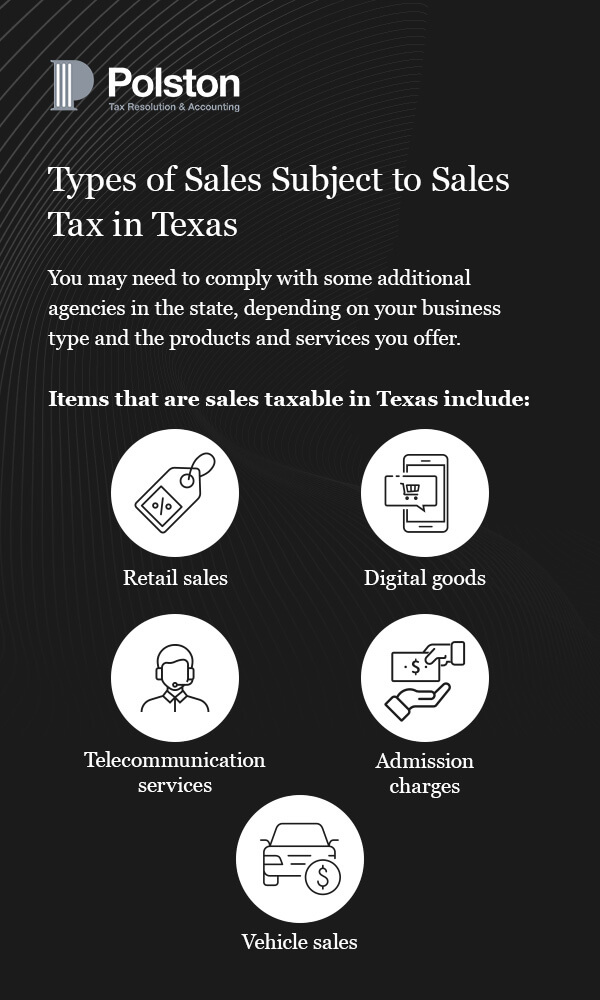
You may need to comply with some additional agencies in the state, depending on your business type and the products and services you offer. For example, software as a service (SaaS) is considered a data processing service and is subject to sales tax. You also have to pay sales tax on used items in Texas. Most tangible property sales and services are generally subject to sales tax, with a few exceptions. Items that are sales taxable in Texas include:
Most retailers need to charge sales and use tax in Texas and remit the tax totals back to the state. To calculate sales and use tax for Texas, determine your taxable sales for the reporting period and the applicable tax rate based on the state’s base rate and any additional taxes imposed by local jurisdictions. Multiply your sales by the tax rate to get the total sales tax due to the Texas Comptroller. For use tax, determine the taxable purchases and applicable tax rate. Multiply the purchases by the tax rate to determine your total use tax due.
Be sure you understand the difference between total and taxable sales in Texas — total or gross sales reflect the sum of all sales conducted within a specified period. Taxable sales refer only to those not exempt from taxes, so only the total of transactions where you collected sales or use tax.
For sales, leasing and rental of retail goods in Texas, businesses need to collect and pay the sales tax, whether this is in a brick-and-mortar store or an online sale for a company with economic nexus in the state. Certain sales are subject to additional taxes.
Short-term lodging and rentals for hotel rooms, vacation rentals, motels and other accommodations for less than 30 consecutive days are subject to sales tax. The tax rate depends on whether it is a state, local or a combination of both taxes, although local jurisdictions often have their own occupancy taxes on top of the state tax. There is a 6% hotel tax on banquet and meeting rooms, but this is not the same as the occupancy tax on rooms used for sleeping.
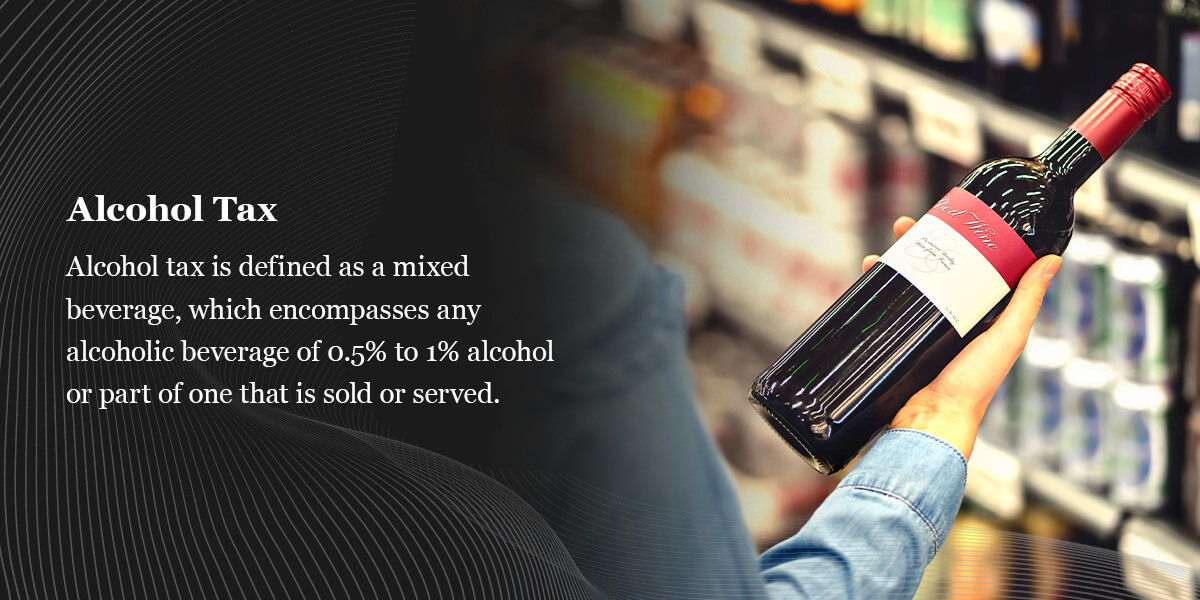
Alcohol is defined as a mixed beverage, which encompasses any alcoholic beverage of 0.5% alcohol by volume or part of one that is sold or served. These sales are subject to both local and state sales taxes. The tax here varies based on the type of alcohol. Mixed beverage gross receipts are taxed at 6.7%, and the sales tax rate is 8.25%. It is worth noting that a wine and beer retailer permit is not subject to mixed beverage taxes.
The state imposes a motor vehicle rental tax, and local authorities can add their own rental taxes on top of this. The tax rate depends on the length of the rental contract. Short-term rentals of one to 30 days incur 10% rental taxes. Long-term rentals up to 180 days are subject to 6.25% rental taxes.
Texas imposes excise taxes on all tobacco products, including cigarettes, smokeless tobacco and cigars. Distributors, wholesalers and retailers are subject to an initial permit fee that allows them to sell these products. For a pack of 20 cigarettes, the taxable amount is $1.41. The rates may also vary depending on the product and quantity, with a package of 25 cigarettes taxed at $1.76 per pack.
Cigars are taxed at 1 cent per 10 on cigars weighing 3 pounds or less per thousand, with chewing tobacco starting at $1.46 for 1.2 ounces or less.
Sales of prepared food and beverages for immediate consumption, like fast food or restaurant meals, are subject to sales tax. However, most grocery store food items are exempt from Texas sales and use tax. Tax is due on nonfood items often sold at grocery stores, such as paper products, pet supplies and cosmetics. Additionally, tax is due on the following items:
Local jurisdictions have the authority to impose additional sales taxes, over and above the state’s base sales and use taxes, for various purposes. However, the total tax that sellers can collect is capped at 8.25%, which is the combined maximum state and local sales tax. These taxes may be used to fund local projects, services or infrastructure improvements. If your business is in a jurisdiction where local tax rates apply, you must collect both the base and local discretionary taxes to remit to the state when you file your taxes.
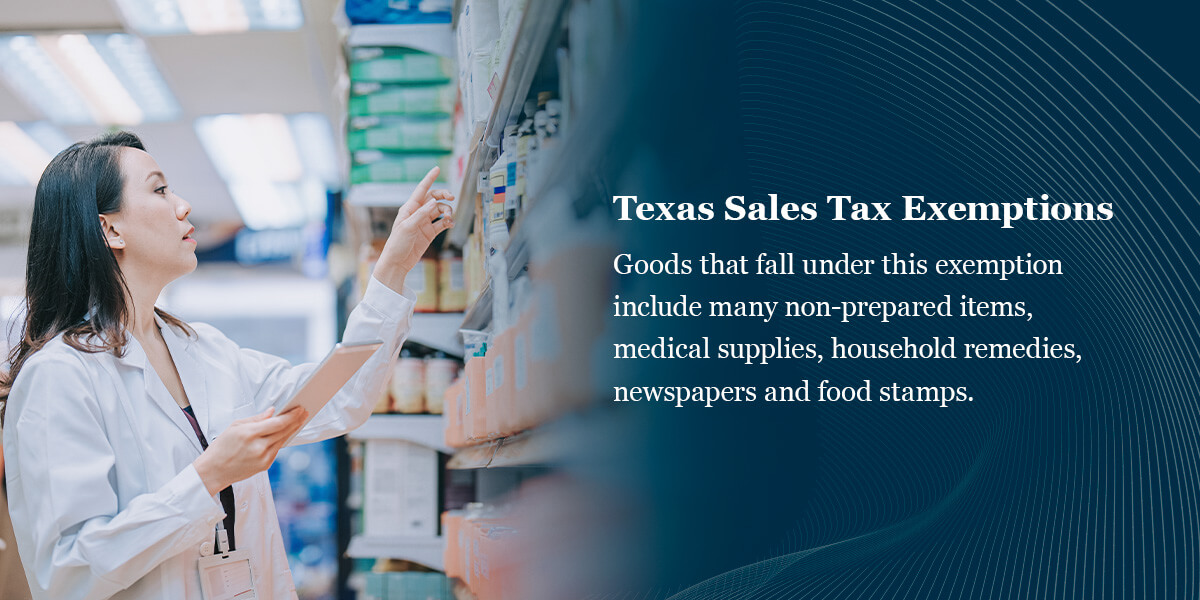
Certain goods and customers are exempt from sales tax under Texas law. Goods that fall under this exemption include many nonprepared food items, medical supplies, household remedies, newspapers and Supplemental Nutrition Assistance Program (SNAP) benefits. Customers exempt from paying sales tax include certain nonprofit organizations, government agencies and merchants who purchase items for resale.
To verify this exemption, sellers may request a valid resale or exemption certificate and keep it for their records for when they file sales taxes. If this certificate gets lost, request a new copy from the client as soon as possible, as you must keep these documents on file for four years after the initial purchase.
Some manufacturing and distributing equipment qualifies for tax exemption, including that which brings about chemical or physical changes in a product to make it sellable.
You can look into sales tax incentives offered by the state to boost business growth. The Texas Enterprise Zone Program provides tax refunds to operations located in specific areas, and the manufacturing exemption covers businesses manufacturing certain equipment and machinery.
Businesses that fail to collect sales tax may be held responsible for paying the uncollected tax amount out of their own funds. This can put considerable strain on the organization. Suppose your company has nexus, and you still need to collect sales tax. In that case, you can either register for tax, paying your back taxes along with penalties and interest or you can complete a voluntary disclosure program, which may cut down some of your interest.
The Texas Comptroller’s office may also choose to conduct audits on businesses, ensuring compliance with sales tax regulations. These audits will detect any sales tax that has yet to be remitted. It can also become a time-consuming and costly endeavor for businesses. Any discrepancies found can result in penalties with additional interest charges, depending on how overdue your remittance is.
Noncompliance may also lead to legal consequences, including fines and additional legal fees for the business owner. Additionally, the company risks losing sales tax permits to conduct business in Texas legally. All of this can harm the business’s reputation as customers may expect tax-inclusive pricing.
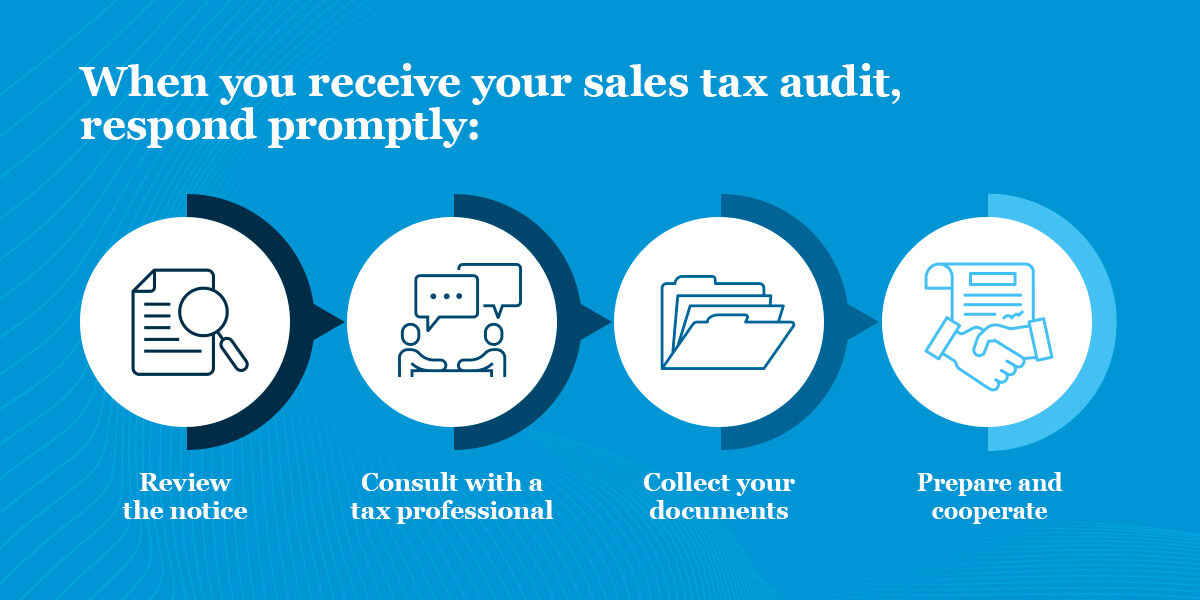
Audits are standard and not necessarily something to be worried about. This is where robust recordkeeping comes in handy. When you receive your sales tax audit, respond promptly:
It’s best to familiarize yourself with your obligations and rights as a taxpayer during an audit. You are entitled to appeal audit results if you believe they are incorrect. Audits offer you an opportunity to improve your sales tax compliance and procedures. If you haven’t been collecting and remitting sales tax correctly, ensure you do so moving forward. Also, keep all audit-related documents, correspondence and records for a few years in case you ever need to reference them or appeal findings in the future.
Often, the Texas Comptroller’s sales tax auditor calls you first, after which you get a notice to confirm your business is being audited. The auditor conducts preaudit research and schedules a conference. They also request records to reference. During the audit, they compare your Texas-based sales and use tax returns to confirm that all your gross sales were reported on your business sales tax returns.
Next, the auditor reviews out-of-state and exempt sales, followed by a use tax audit. Elements that fall into this audit include, but are not limited to:
Once the audit is complete, you generally meet with the auditor to review the report and corresponding work papers to support the assessment. This offers an excellent opportunity to have a reputable sales tax professional by your side, giving pushback where needed and ensuring your audit aligns with your business dealings. Review the auditor’s findings and calculations carefully, noting each point you disagree with.
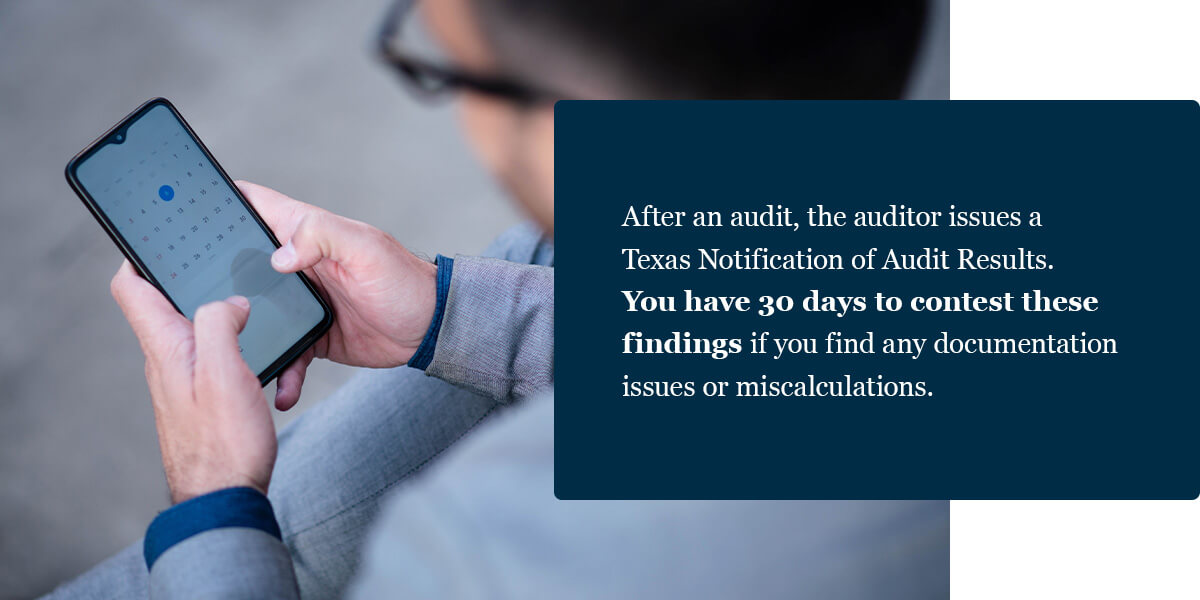
After an audit, the auditor issues a Texas Notification of Audit Results. You have 30 days to contest these findings if you find any documentation issues or miscalculations. If there is no resolution, you can appeal to the Texas Comptroller within 60 days of the issuance of the Notification of Audit Results. Doing this with someone well-versed in Texas state tax and local laws is best to ensure you follow all legal proceedings correctly.
Once you establish your sales tax nexus within the state, you can register with the state authorities to collect, file and remit your sales tax. There is no cost to registering, although you must already have a registered business to register for sales tax. You can do this by registering the company under the current owner’s name and contact details with the Texas Comptroller of Public Accounts.
Visit the Texas Comptroller of Public Accounts website to register for your Texas Business Tax License online. You need your business name, address, contact information and federal employer identification number (FEIN). Additionally, provide the date your business activities will start, projected monthly sales with taxable sales and an inventory of products you plan to sell. The Comptroller will process your application within a few weeks, though it can take longer if you apply by mail.
After you have confirmation that your registration for sales tax in Texas is complete, ensure you stay compliant, collect the right amount of sales tax, file your returns on time or early if you can, and keep adequate records of all your business transactions and purchases. It’s better to have ample records and information than to find you lack anything important when it is time to file your sales taxes.
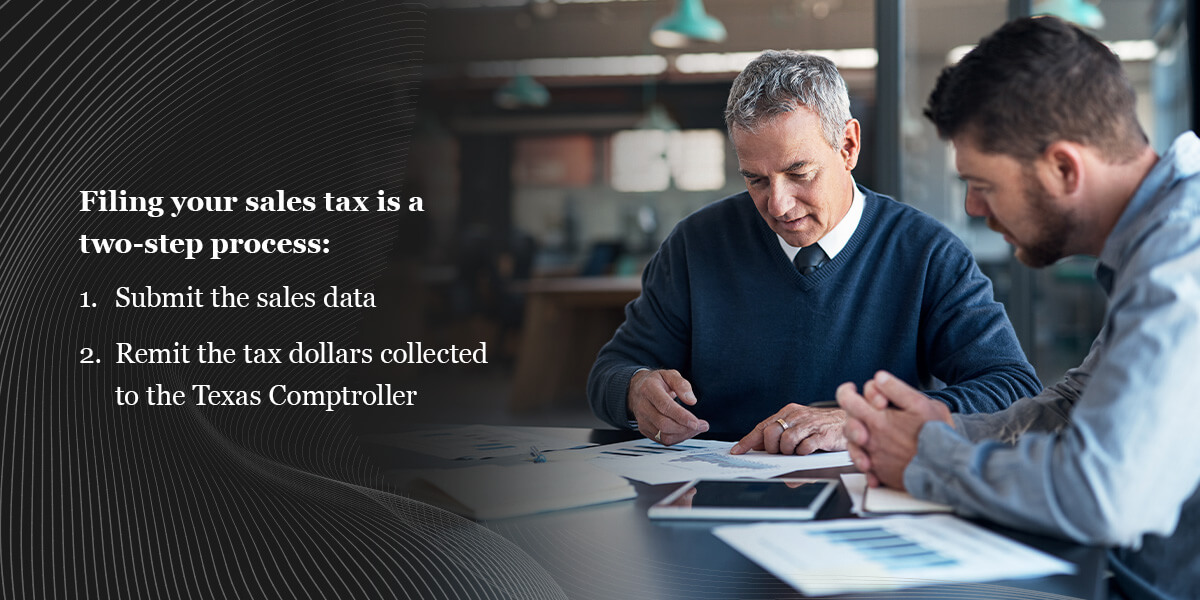
Filing sales tax is a two-step process — submit the sales data and then remit the tax dollars collected to the Texas Comptroller. You can file online or download Form 01-114, the Texas Sales and Use Tax Return, for manual submission at the tax office.
If you had no sales in the preceding fiscal year, log on to file your taxes, but select the option to file “zero return.” You can be liable for interest charges and penalties if you do not file at all, even with no sales. The same applies to closing, selling and transferring ownership of a business. You will have to file one final tax return.
Taxes do not apply to all business sales. You will only pay sales tax on your total taxable sales in Texas. The state’s sales tax periods are divided into monthly, quarterly and annual filing. The Texas Comptroller of Public Accounts offers a discount of 0.5% for timely tax filing or 1.25% for early payment. When you register for a sales tax permit, the Comptroller will tell you how often you need to file, including:
Failing to file your taxes can result in penalties of 5% when you are 1 to 30 days late and 10% if paid over 30 days after the due date.
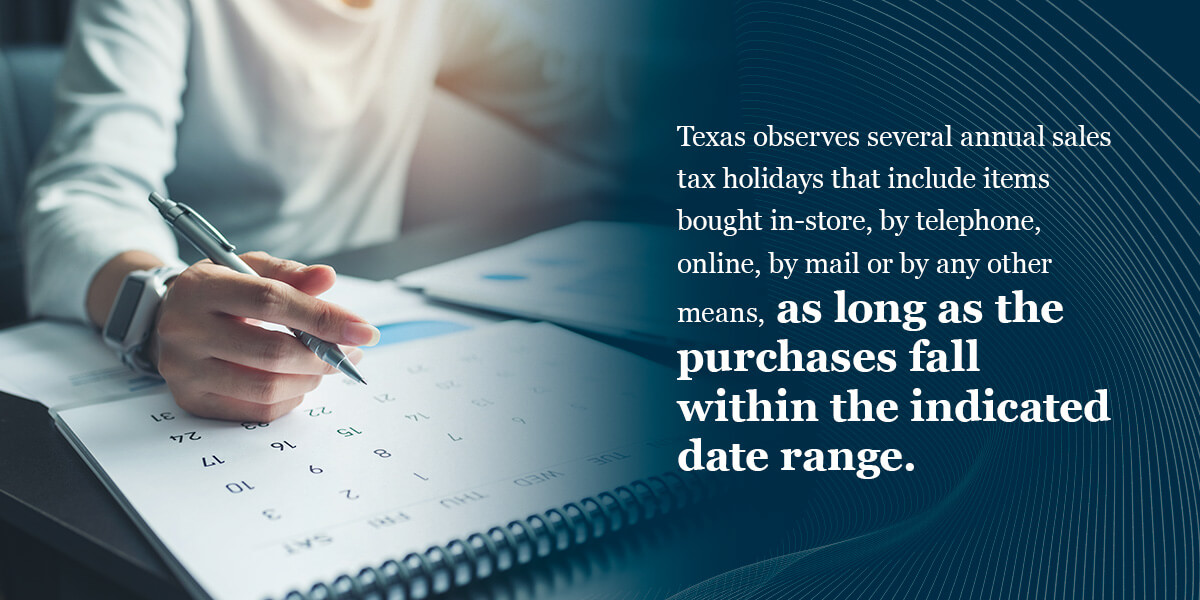
Texas observes several annual sales tax holidays that include items bought in-store, by telephone, online, by mail or by any other means, as long as the purchases fall within the indicated date range. The Texas EnergyStar® and water-efficient products over Memorial Day weekend, emergency preparedness supplies during several days in April, and back-to-school items sold for less than $100 over a specific weekend in early August are all annual Texas sales tax holidays.
If you charge tax during these periods, customers are entitled to request a refund of the tax they paid, either directly from you or by filing the refund claim with the Comptroller’s office.
Collecting and remitting sales tax accurately and on time is legally required to comply with Texas tax law. Texas is an origin-based sales tax state, so taxes are based on the seller’s location or the point of origin of the sale rather than the location of the buyer. Start by applying the correct tax rate to your goods and services. Keep detailed records of your sales and file your tax returns promptly. How you collect your sales tax depends on how you sell your products or services:
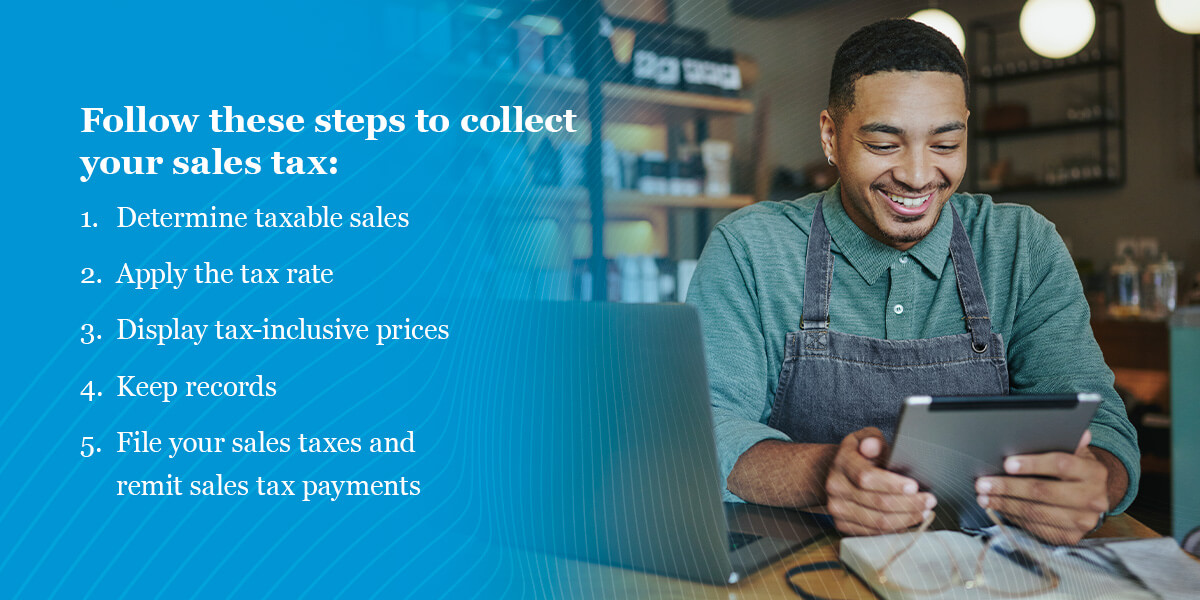
Follow these steps to collect your sales tax:
Generally, if the sale of a product or service is taxable, the related shipping or delivery charges before and after the sale are taxable. To collect taxes on shipping and handling, you must add those expenses to the overall cost for the product or service. Then, you can calculate taxes on the combined costs.
Our company began in 2001, focusing on helping people navigate back taxes. It has grown over time and now has more than 100 employees. Our team members range from certified public accountants (CPAs) licensed in Texas to attorneys. Together, we bring comprehensive knowledge of applicable tax laws, including sales tax regulations specific to your state.
If you’re facing a state sales tax audit, our team can guide you through the process. Learn more about our services or contact us online to get started.